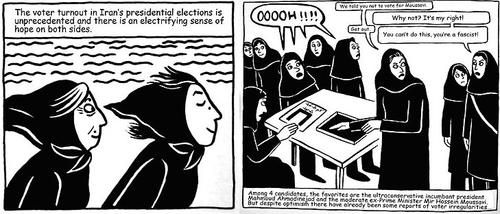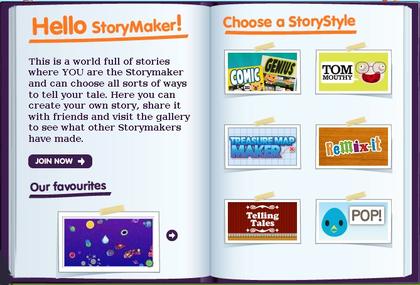The Latest from Boing Boing |  |
- We Make Stories: tool to let kids make physical books
- Explaining physics to a TV camera
- Automated shakedown racket sends legal threats, demands cash
- Rubber Room: documentary about New York teacher purgatory
- New Pirate Parties spring up all over Europe
- 2009 Locus Award winners
- Honduran coup is the first successful military coup d'etat in the region since the Cold War ended
- Lenovo expanding Del and Esc keys, nuking Caps Lock
- Persepolis 2.0: fan-art story about Iran elections
- CC-licensed photo-book to accompany my CC-licensed essay on CCTVs
- Thank you and farewell
- The Devil's Kettle
- Pirate Bay founders launch beta of "The Video Bay"
- God Hates the World, by Westboro Baptist Church
- "Crop Circles" Reveal an Ancient Burial Site a Thousand Years Older Than Stonehenge
| We Make Stories: tool to let kids make physical books Posted: 29 Jun 2009 04:49 AM PDT Jeremy Ettinghouse from Penguin sez, We Make Stories (Thanks, jeremyet!) |
| Explaining physics to a TV camera Posted: 29 Jun 2009 02:53 AM PDT Diandra Leslie-Pelecky, a physicist who's got a good rep with her local news media, describes the process she went through to calculate the sound-bites explaining how a styrofoam soda-cup thrown from an oncoming car managed to smash the windscreen of the car it hit. The reporter for Channel 8 asked me what the force actually meant. The best way to describe it would be that a scale placed on the windshield would register between 20 and 120 lbs when the cup hit. That quick calculation convinced me that it wasn't beyond the realm of possibility that a drink cup could actually break a windshield. If the cup were thrown, even a pretty bad arm could give it an additional 30-40 mph, so the force could have been much larger.dial-a-scientist |
| Automated shakedown racket sends legal threats, demands cash Posted: 28 Jun 2009 11:13 PM PDT Former cigarette retailer Nexicon has a new shakedown racket: they automatically detect things that look like copyright infringement on the net, automatically find people who look like they're responsible for it, then automatically send a dire legal threat demanding cash to go away. Mostly, they work for pornographers, and the estate of Frank Zappa. The process is simple. Their software monitors BitTorrent swarms and other filesharing networks and records the IP-addresses of those people who share the work of their clients. It then automatically sends an email to the ISP linked to the IP-address with a request to forward it to the associated customer...Automated Legal Threats Turn Piracy Into Profit (via Digg) |
| Rubber Room: documentary about New York teacher purgatory Posted: 28 Jun 2009 10:26 PM PDT The Rubber Room is the name for the places where New York City teachers who are under disciplinary investigation are sent to await their. For months -- sometimes years, and sometimes decades, these teachers go to "work" every day in a mostly bare room, and wait, and wait, and wait. Even if exonerated, many of these teachers are so stigmatized that they have to switch careers. Sounds like something out of Sartre or Kafka, but it's just New York. Here's a documentary on the Rubber Room, made by an ex-teacher who was sentenced to it. RubberRoomMovie.com (via DNTO) |
| New Pirate Parties spring up all over Europe Posted: 28 Jun 2009 10:22 PM PDT After the Swedish Pirate Party (devoted to copyright liberalization and Internet freedom) took a seat* in the last EU election, new local Pirate Parties have launched in France (where a series of restrictive Internet laws have been proposed by Sarkozy) and the Czech Republic. The Czech party has collected 2,500 electronic signatures to date and hopes to compete in October elections. It was just certified as an official political party by the Czech Interior Ministry under the name "Českou pirátskou stranu" (ČPS).Pirate parties parade through Prague, Paris *Two seats, if the Treaty of Lisbon is ratified Previously:
|
| Posted: 28 Jun 2009 10:19 PM PDT The 2009 Locus Award winners for best science fiction and related books published in 08, as voted by the general public, have been announced. A good place to start your reading if you want to read some of the best stuff out there. Science Fiction Novel: Anathem, Neal Stephenson (Atlantic UK, Morrow)2009 Locus Award Winners Previously:
|
| Honduran coup is the first successful military coup d'etat in the region since the Cold War ended Posted: 28 Jun 2009 11:41 PM PDT Honduras has undergone a military coup, with left-leaning president Manuel Zelaya being sent into exile by the Army after proposing a referendum on a constitutional change that would have let him run for a We honeymooned on Roatan, one of Honduras' Bay Islands, and it was not without its political problems. Indeed, martial law was briefly declared on Roatan during our two week stay, after a series of blockades and sabotage in protest of massive rate-hikes from the newly privatized power company. Zelaya's personal handling of that problem was less than perfect. But as developing nations' governments go, Honduras had a pretty stable, relatively non-corrupt government and administration. Certainly, a military coup is less democratic than a leader seeking a mandate to try for a constitutional reform. U.S. President Barack Obama and the European Union expressed deep concern after troops came for Zelaya, an ally of socialist Venezuelan President Hugo Chavez, around dawn and took him away from his residence. He was whisked away to Costa Rica.Army overthrows Honduras president |
| Lenovo expanding Del and Esc keys, nuking Caps Lock Posted: 28 Jun 2009 10:10 PM PDT Lenovo's new laptop keyboards have bigger Del and Esc keys, which sounds right to me. I love the Lenovo ThinkPad keyboards more than any other keyboard I've tried. I recently switched away from Thinkpads for a season and then switched back and I could almost hear my fingertips sighing in relief as they touched down on the clacky, springy, responsive X200 keyboard. What a treat. After a year's research, Lenovo boffins have installed larger Delete and Escape keys on their updated ThinkPad laptop T400s range...Lenovo increases size of panic buttons (via /.) |
| Persepolis 2.0: fan-art story about Iran elections Posted: 28 Jun 2009 10:07 PM PDT  Yishay sends us Persepolis 2.0, "a mini graphic novel telling the story of the last two weeks in Iran, in the style of Marjane Satrapi, by two Iranians living in Shanghai" Persepolis 2.0 (Thanks, Yishay!) Previously:
|
| CC-licensed photo-book to accompany my CC-licensed essay on CCTVs Posted: 28 Jun 2009 09:52 PM PDT Emma sez, "Snitchtown: the photo essay" is a book of photographs of a (very small) subset of the 4.2 million CCTV in Britain. These have been put together with Cory Doctorow's essay on ubiquitous CCTV coverage, "Snitchtown" as part of the SoFoBoMo event, in which photographers work to put together a solo project in book form in one month.This is, I believe, my absolute favorite CC adaptation of my work to date; in that it's the first adaptation that I prefer to my original. Great work, Emma! Previously: |
| Posted: 28 Jun 2009 08:47 PM PDT Joshua Foer and Dylan Thuras are guest bloggers on Boing Boing. They are co-founders of the Atlas Obscura: A Compendium of the World's Wonders, Curiosities, and Esoterica.
One of the best parts of this experience has been following the thoughtful and wide-ranging discussion thread comments. We're awed by the responsiveness of BB's readers, and by the generosity with which you all have shared your knowledge and opinions. We especially want to thank everyone who has taken time to add places to the Atlas Obscura. Over the last two weeks, the site has already grown to be more than just a collection of "wondrous, curious, and esoteric" places. Your contributions and comments are starting to turn it into a community. We hope you'll continue to share your knowledge of obscure places, so that we can continue to build the site into a truly awesome resource. Please stay in touch with any thoughts, critiques, or suggestions that come to mind. Thanks again! All Best, Josh and Dylan |
| Posted: 28 Jun 2009 06:02 PM PDT Joshua Foer is a guest blogger on Boing Boing. Joshua is a freelance science journalist and the co-founder of the Atlas Obscura: A Compendium of the World's Wonders, Curiosities, and Esoterica, with Dylan Thuras.  I ought to leave the Minnesota curiosities to Dylan, since that's his home turf, but I was just poking around the Atlas and stumbled on a mysterious waterfall called the "Devil's Kettle," recently added by a user named nursecarman. I realized I'd never seen anything quite like it before. There is a mysterious waterfall in Judge Magney State Park in Minnesota. Half of the water drops 50 feet into the Brule river; the other half falls into a cauldron and disappears! Dyes and ping pong balls have been dropped into the pothole in an attempt to trace its route and find its outlet--presumably the water winds its way underground to Lake Superior a mile away--but the other end of the Devil's Kettle has yet to be found. Anyone know of any other disappearing waterfalls like this? I'm guessing there must be others. |
| Pirate Bay founders launch beta of "The Video Bay" Posted: 28 Jun 2009 10:10 PM PDT  The developers behind the Pirate Bay team have been developing a video streaming site for the past two years, and an "extreme beta" version of the project is available (meaning, in their words, "Don't expect anything to work at all"). Users can share video clips here without having to fear concerns they may be removed over copyright claims, as with the current dominant video-sharing service, YouTube. Snip from an item on Torrentfreak: However, as with most of their projects it can take a while before the public can catch a glimpse of what they are working on. The Video Bay - as the project is named - opened up to the public with a very early test version a few weeks ago. Initially, users were able to browse though the videos but this has been disabled now. What is left is an announcement that the site will be launched somewhere in the future.(...)The Video Bay.
Previously:
|
| God Hates the World, by Westboro Baptist Church Posted: 28 Jun 2009 10:16 PM PDT The part that starts right about 5 minutes in is utterly terrifying and sad. Watch the whole thing from the top, though. "God Hates the World," brought to you by Westboro Baptist Church who previously became internet-famous for "God Hates Fags" and "God Hates America." Incidentally, the song and lyrics of which this is a remake were co-created by none other than the recently departed Michael Jackson. (Uh, thanks Richard Metzger).
Previously: |
| "Crop Circles" Reveal an Ancient Burial Site a Thousand Years Older Than Stonehenge Posted: 28 Jun 2009 02:24 PM PDT Dylan Thuras is a guest blogger on Boing Boing. Dylan is a travel blogger and the co-founder of the Atlas Obscura: A Compendium of the World's Wonders, Curiosities, and Esoterica, with Joshua Foer. Riffing off David's recent post about stoned wallabies making crop circles, here is yet another set of "crop circles," made this time not by marsupials but by the gravesites of prehistoric man. From National Geographic
Link to the National Geographic article |
| You are subscribed to email updates from Boing Boing To stop receiving these emails, you may unsubscribe now. | Email delivery powered by Google |
Inbox too full?  | |
| Google Inc., 20 West Kinzie, Chicago IL USA 60610 | |

 Many thanks to David, Mark, Xeni, Cory, the Boing Boing team, and all of Boing Boing's readers for making these two weeks of guest blogging so terrific. We were thrilled to be able to introduce the
Many thanks to David, Mark, Xeni, Cory, the Boing Boing team, and all of Boing Boing's readers for making these two weeks of guest blogging so terrific. We were thrilled to be able to introduce the 
No comments:
Post a Comment